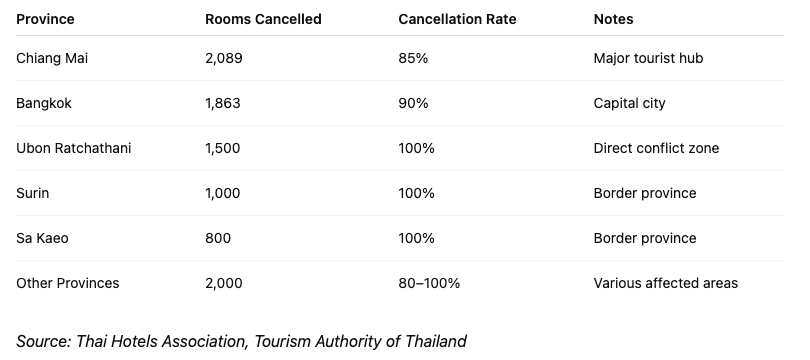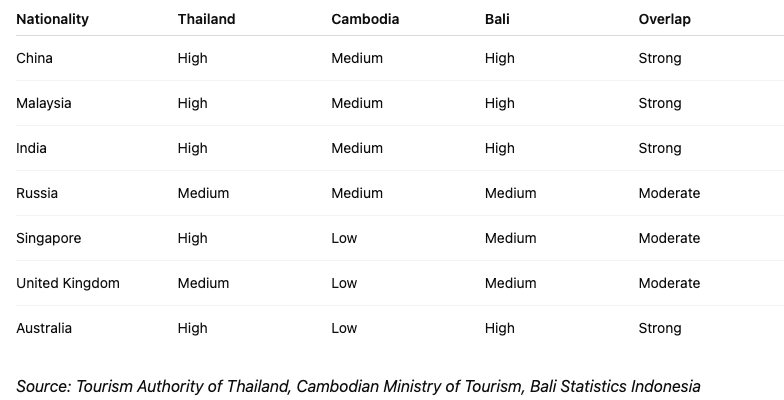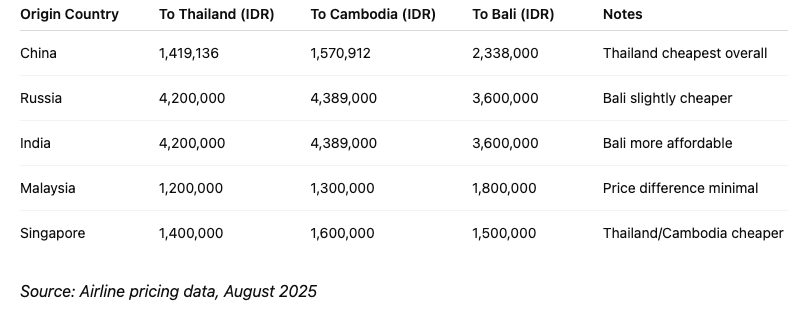Tourism Impact is one of the major sectors being affected by the ongoing Thailand-Cambodia conflict. Hey! I’m Jason, a Business Journalist at Bukit Vista, and today I will explore how this escalating border dispute is reshaping travel patterns across Southeast Asia. Specifically, we’ll look at how Bali stands to capture the diverted tourism flows, especially from Russia, China, and Malaysia. With Thailand’s tourism sector in turmoil, Bali’s resilience and appeal have positioned it as a strong contender for these redirected tourists.
The Thailand-Cambodia Conflict and the Tourism Impact

The Thailand-Cambodia conflict, which began in July 2025, has led to significant disruptions in the tourism industry across the region. Armed clashes, including artillery exchanges and airstrikes, have forced the closure of several key tourist sites, especially along the border regions. As a result, tourists have cancelled trips to affected provinces in both Thailand and Cambodia, as these areas have become synonymous with instability. While the physical impact is contained mainly to the border, the psychological perception of risk has spread to other areas, causing widespread cancellations.
However, major tourist hubs in Thailand and Cambodia, such as Bangkok, Phuket, Phnom Penh, and Siem Reap, remain safe and operational, despite being far from the conflict zones. These cities and islands are geographically distant from the active combat zones, with no direct threats reported. Nevertheless, the uncertainty surrounding the conflict, coupled with heightened travel advisories, has created a significant drop in bookings, particularly from international tourists concerned about safety.
Bali’s Role as a Safe Haven for Diverted Travelers

Bali has quickly emerged as the go-to destination for travelers seeking stability in the wake of the conflict. As tourists cancel their plans to visit Thailand and Cambodia, many are turning to Bali, which is perceived as a safe and welcoming alternative. With its well-established tourism infrastructure and reputation for offering a wide range of experiences, Bali provides a sense of reassurance for those seeking an escape from regional instability. Moreover, the island’s continued stability and absence of any direct threats from the ongoing conflict further cement its position as a reliable destination.
Bali’s strong air connectivity and its strategic location in the region also play a significant role in its ability to absorb diverted tourist flows. In addition, Bali’s increasing appeal to long-term travelers, particularly digital nomads, offers an added draw for tourists planning extended stays. With the island offering visa flexibility, co-working spaces, and a growing expatriate community, Bali presents an attractive alternative for travelers who might have otherwise chosen Thailand or Cambodia for shorter vacations.
The Appeal of Bali for Regional Tourists

Bali’s appeal to travelers goes beyond just safety—it also offers substantial value through various initiatives aimed at enhancing the visitor experience. The island’s growing popularity as a digital nomad hotspot is one of the key factors in its resilience. Indonesia’s new visa policies, which allow remote workers to stay for up to 180 days tax-free, are particularly attractive for long-term visitors. Additionally, Bali’s infrastructure, including extensive co-working spaces and support for remote work, positions it as an ideal destination for the new era of digital nomads.
Furthermore, Bali offers a wide variety of cultural experiences, wellness retreats, and eco-friendly tourism options, which have seen a rise in demand in recent years. This diversification of tourism products makes the island appealing to a broader audience, including families, solo travelers, and those seeking a spiritual or wellness-focused vacation. These attributes are increasingly drawing travelers who are either looking to avoid conflict zones or who are looking for new destinations altogether due to the ongoing disruptions in Thailand and Cambodia.
Conclusion:
In conclusion, the Thailand-Cambodia conflict has caused significant disruptions to regional tourism, leading to widespread cancellations. While major tourist hubs in both Thailand and Cambodia remain safe, the psychological impact of the conflict has pushed many tourists to reconsider their travel plans. Bali, with its stable environment, competitive pricing, and growing infrastructure, is well-positioned to capture the diverted tourist flows. As travelers continue to seek safe and stable destinations, Bali’s resilience and appeal will ensure that it remains a top alternative for those shifting away from the conflict zones.
Key Takeaways:
The Thailand-Cambodia conflict has led to widespread tourism cancellations, particularly in border areas.
Bali offers a stable, safe environment with competitive pricing, making it an attractive alternative for diverted travelers.
Bali’s growing appeal to digital nomads and long-term travelers provides additional growth potential.
Flight prices from key markets to Bali are competitive, particularly from India and Russia.
Take the First Step to Joining Our Community, Book Your Seat at Our Round Table Talk Today!
At Bukit Vista, we believe in creating lasting partnerships that help nagivate your property to the top 1% in this competitive season. Join us to discover how we can work together.

